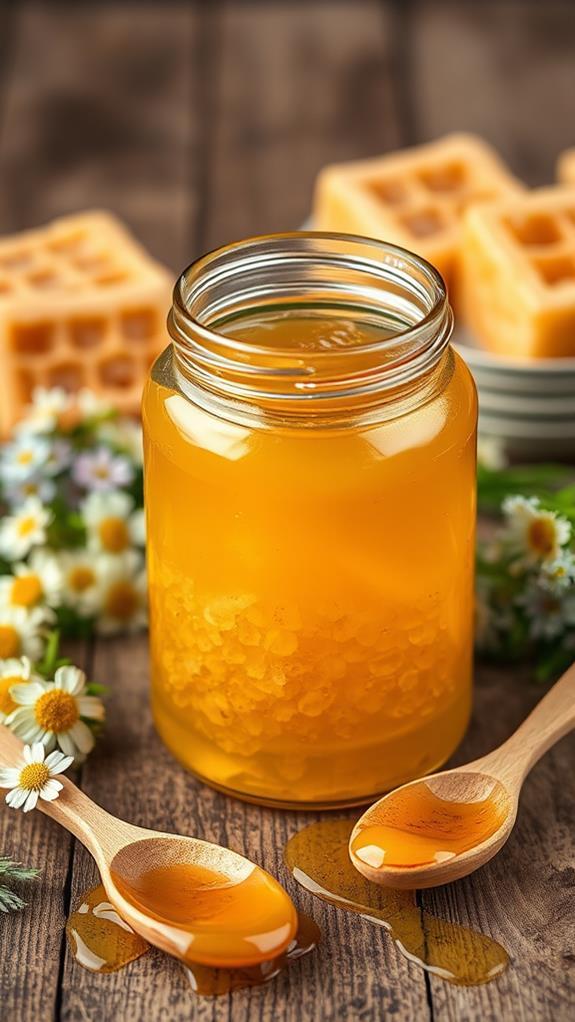Is Fermented Honey Safe to Eat
Fermented honey is generally safe to eat when properly produced and stored. It's created through controlled fermentation, which can enhance its flavor and potentially boost its health benefits. However, you should be aware of some risks. Uncontrolled fermentation may lead to the growth of harmful microorganisms or excessive alcohol content. People with weakened immune systems or specific health conditions should consult a healthcare professional before consuming it. Proper handling and storage are indispensable to maintain its safety and quality. When purchasing fermented honey, look for products from reputable sources that follow food safety regulations. Understanding the fermentation process and potential risks can help you make informed decisions about including this unique product in your diet.
This post may contain affiliate links. If you make a purchase through these links, I may earn a commission at no additional cost to you. Additionally, portions of this post may be generated using artificial intelligence (AI) technology. While we strive for accuracy, please be aware that AI-generated content may not always be perfect and should be fact-checked when necessary.
The Spatula Scoops
- Properly produced and stored fermented honey is generally safe for consumption.
- Uncontrolled fermentation can lead to unwanted microorganism growth, potentially making the honey unsafe.
- Excessive alcohol content or contamination with harmful bacteria are potential risks of improperly fermented honey.
- Individuals with weakened immune systems or specific health conditions should consult a healthcare professional before consuming.
- Proper handling, storage, and adherence to food safety standards are crucial for ensuring the safety of fermented honey.
Understanding Fermented Honey

Fermented honey, also known as liquid gold among beekeepers, is a natural process that occurs when honey's sugar content begins to break down. This transformation happens when the honey's moisture content rises above 20%, allowing yeasts naturally present in the honey to become active. As these yeasts consume the sugars, they produce alcohol and carbon dioxide, leading to fermentation. Similar to chocolate bloom, fermentation can alter the appearance and texture of honey without necessarily affecting its safety for consumption.
You'll notice that fermented honey has a distinct smell, often described as sour or wine-like. Its texture may become frothy or bubbly, and the taste can range from slightly tangy to strongly acidic. The fermentation process can alter the honey's color, making it appear darker or cloudier than its original state.
It's important to understand that fermentation in honey isn't always intentional. Factors like improper storage, exposure to moisture, or harvesting honey before it's fully ripened can trigger this process. While some cultures deliberately ferment honey to create beverages like mead, unintentional fermentation is generally considered undesirable in the honey industry. Beekeepers and honey producers typically endeavor to prevent fermentation to maintain the honey's quality and shelf life.
The Fermentation Process
Now that we've covered the basics of fermented honey, let's examine how this process unfolds. Fermentation in honey occurs when the sugar content falls below 17.1%, allowing yeast to thrive. This typically happens when honey absorbs moisture from its environment. Similar to bay leaf infusion, the process involves careful monitoring to guarantee safety and ideal flavor development.
The yeast naturally present in honey begins to consume the sugars, converting them into alcohol and carbon dioxide. This process is similar to brewing beer or making wine. As fermentation progresses, you'll notice changes in the honey's texture, flavor, and aroma. It may become more liquid, develop a slightly sour taste, and emit a faint alcoholic scent.
The duration of fermentation varies depending on factors like temperature, moisture content, and yeast concentration. It can take anywhere from a few days to several weeks. During this time, the honey's composition changes, potentially increasing its probiotic content and altering its nutritional profile.
It's important to note that controlled fermentation differs from spoilage. While intentionally fermented honey can be safe and even beneficial, uncontrolled fermentation may lead to unwanted microorganism growth. To guarantee safety, it's imperative to monitor the process carefully and maintain proper hygiene standards throughout.
Nutritional Profile

When you're considering fermented honey's nutritional profile, you'll find it retains many of the vitamins and minerals present in regular honey. It's crucial to recognize that fermentation may introduce beneficial probiotics, potentially enhancing the honey's health benefits. Similar to nutritional yeast seasoning, fermented honey can be a versatile addition to various dishes, offering unique flavors and potential health advantages. However, you should be aware that the fermentation process can affect sugar content and calorie levels, which may differ from those of unfermented honey.
Vitamins and Minerals Content
The nutritional profile of fermented honey might surprise you. While it retains many of the vitamins and minerals found in regular honey, the fermentation process can alter their concentrations and bioavailability. You'll find that fermented honey typically contains:
- B-complex vitamins, including B6 and B12
- Vitamin C, which may increase due to microbial activity
- Minerals like potassium, calcium, and magnesium
- Trace elements such as zinc and selenium
The fermentation process can enhance the antioxidant properties of honey, potentially increasing its content of phenolic compounds and flavonoids. These substances contribute to the honey's health benefits and may improve its nutritional value.
It's important to note that the exact vitamin and mineral content can vary depending on the type of honey used and the fermentation process. Factors such as the floral source of the honey, fermentation duration, and the specific microorganisms involved all play a role in determining the final nutritional profile.
While fermented honey isn't a significant source of most vitamins and minerals, it can contribute to your overall nutrient intake. Its unique composition may offer benefits beyond those of regular honey, making it an interesting addition to your diet.
Probiotic Potential Benefits
Beyond its vitamin and mineral content, fermented honey boasts potential probiotic benefits that set it apart from regular honey. As the honey ferments, beneficial bacteria multiply, potentially enhancing its health-promoting properties. These probiotics may support your digestive system, boost your immune function, and improve overall gut health.
The fermentation process introduces various strains of beneficial bacteria, each offering unique advantages:
| Probiotic Strain | Potential Benefit | Found in Fermented Honey |
|---|---|---|
| Lactobacillus | Digestive support | Yes |
| Bifidobacterium | Immune boost | Sometimes |
| Saccharomyces | Antioxidant effect | Occasionally |
You'll find that fermented honey's probiotic content can vary depending on the fermentation method and duration. It's essential to understand that while these potential benefits are promising, more research is needed to fully comprehend the extent of fermented honey's probiotic advantages.
When you consume fermented honey, you're not just enjoying its unique taste but also potentially supporting your body's microbiome. However, it's vital to remember that fermented honey shouldn't replace a balanced diet or prescribed medications. Always consult with a healthcare professional before incorporating new foods into your diet, especially if you have specific health concerns or conditions.
Sugar and Calorie Levels
Fermented honey's nutritional profile differs slightly from that of regular honey, particularly with regards to sugar content and calorie levels. As fermentation progresses, the yeast consumes some of the sugars, potentially reducing the overall sugar content. This process may result in a slightly lower calorie count compared to regular honey, though it's crucial to acknowledge that fermented honey still remains a high-calorie food.
The nutritional changes in fermented honey include:
- Reduced glucose and fructose levels
- Increased presence of organic acids
- Potential decrease in overall calorie content
- Possible increase in certain B vitamins
You'll find that the exact sugar and calorie levels in fermented honey can vary depending on factors such as fermentation duration, yeast strains used, and initial honey composition. While fermented honey may have a lower glycemic index than regular honey, it's still a concentrated source of sugars and should be consumed in moderation, especially if you're monitoring your carbohydrate intake. Remember, even with potential probiotic benefits, fermented honey isn't a low-calorie food alternative. Always consider your overall dietary needs and consult a nutritionist if you have specific health concerns.
Potential Health Benefits
Honey's fermentation process can liberate additional health benefits beyond those of regular honey. When honey ferments, it develops probiotics, which are beneficial bacteria that support your gut health. These probiotics can aid digestion, boost your immune system, and potentially improve your overall well-being.
Fermented honey may also have enhanced antioxidant properties. The fermentation process can increase the concentration of certain compounds, like flavonoids and phenolic acids, which help protect your cells from damage caused by free radicals. This could translate to better protection against various diseases and signs of aging.
You'll also find that fermented honey might have increased antimicrobial activity. The lactic acid bacteria produced during fermentation can create compounds that inhibit the growth of harmful microorganisms. This means fermented honey could be even more effective than regular honey at fighting off certain types of bacteria and fungi.
Lastly, the fermentation process can make some nutrients in honey more bioavailable. This means your body might be able to absorb and utilize these nutrients more efficiently, potentially enhancing the nutritional value of the honey you consume.
Safety Concerns

While fermented honey offers potential benefits, it's important to be aware of some safety concerns. The fermentation process can increase the alcohol content in honey, which may not be suitable for everyone. You should be cautious if you're sensitive to alcohol or taking medications that interact with it. Additionally, the fermentation can alter the honey's pH level, potentially making it more acidic.
Consider these key safety points:
- Always check for signs of spoilage before consuming
- Be aware of potential allergic reactions to fermented products
- Consult your healthcare provider if you have underlying health conditions
- Store fermented honey properly to prevent further fermentation
The fermentation process can also introduce new microorganisms into the honey. While many of these are beneficial, there's a small risk of harmful bacteria growth if the fermentation isn't controlled properly. It's essential to source your fermented honey from reputable producers who follow strict hygiene practices.
If you're making fermented honey at home, make sure you use clean equipment and follow proper fermentation techniques. Monitor the process closely and stop fermentation if you notice any off-odors or unusual changes in appearance. By being aware of these safety concerns, you can enjoy fermented honey responsibly.
Expert Opinions
You'll find diverse expert opinions on fermented honey's safety and benefits. Researchers have conducted safety assessments, examining factors like pH levels and microbial content, to determine potential risks. Nutritionists often highlight the probiotic potential and enhanced digestibility of fermented honey, while experienced beekeepers provide practical insights on identifying and using this product safely.
Safety Assessments by Researchers
According to numerous food safety experts, fermented honey is generally considered safe for consumption when produced under controlled conditions. Researchers have conducted extensive studies to assess the safety of this product, examining factors such as pH levels, microbial content, and potential contaminants. You'll find that these assessments typically focus on several key areas:
- Fermentation process control
- Microbial analysis of the final product
- Chemical composition changes during fermentation
- Potential allergen or toxin formation
When you're considering fermented honey, it's important to understand that proper production methods are essential for ensuring safety. Researchers have found that maintaining sterile conditions and controlling temperature during fermentation markedly reduces the risk of harmful bacterial growth. They've also noted that the natural antimicrobial properties of honey often persist through the fermentation process, providing an additional layer of protection.
You should be aware that while most studies conclude fermented honey is safe, some researchers recommend caution for individuals with compromised immune systems or specific health conditions. It's always wise to consult with your healthcare provider if you have concerns about incorporating fermented honey into your diet.
Nutritionists' Perspectives on Benefits
From within the nutrition community, many experts have voiced positive opinions about fermented honey's potential health benefits. You'll find that nutritionists often highlight the increased probiotic content in fermented honey, which may support gut health and boost your immune system. They also point out that the fermentation process can enhance the bioavailability of certain nutrients, making them easier for your body to absorb.
Some nutritionists emphasize the potential antioxidant properties of fermented honey, which could help combat oxidative stress in your body. You might also hear about its possible antimicrobial effects, which could aid in fighting off harmful bacteria. However, it is crucial to recognize that while these benefits are promising, more research is needed to fully understand the extent of fermented honey's impact on human health.
Experts often recommend incorporating fermented honey into your diet in moderation, as part of a balanced nutritional plan. They suggest using it as a natural sweetener in beverages or as a topping for yogurt or toast. Remember, while fermented honey may offer health benefits, it is not a cure-all and should be consumed alongside a varied, nutrient-rich diet.
Beekeepers' Practical Insights
Beekeepers, with their hands-on experience, offer valuable insights into fermented honey. They're often the first to notice changes in their hives' honey production and quality. When it comes to fermented honey, beekeepers can provide practical observations that complement scientific findings.
From a beekeeper's perspective, you'll find that fermented honey isn't necessarily a cause for concern. They often point out:
- Natural fermentation can occur in uncapped honey cells
- Slight fermentation may enhance flavor profiles
- Proper storage conditions can prevent undesirable fermentation
- Controlled fermentation is sometimes used for specialty products
You'll learn that beekeepers typically recognize fermented honey by its distinct smell, bubbling appearance, and slightly sour taste. They'll advise you that while fermented honey is generally safe to consume, it's essential to differentiate between intentional fermentation and spoilage. Beekeepers emphasize the importance of proper harvesting techniques and storage methods to maintain honey quality. They'll often recommend storing honey in airtight containers at room temperature to prevent moisture absorption, which can lead to undesirable fermentation. By understanding these practical insights, you'll gain a better appreciation for the complexity of honey production and preservation.
Culinary Uses

Fermented honey's culinary applications extend beyond its raw counterpart. You'll find it adds depth and complexity to various dishes, both sweet and savory. In baking, it can provide a tangy twist to traditional recipes, enhancing breads, cakes, and pastries with its unique flavor profile. When used in marinades or glazes, fermented honey imparts a rich, nuanced taste to meats and vegetables, elevating your grilling or roasting game.
You might also consider incorporating fermented honey into your beverage repertoire. It's an excellent addition to cocktails, mocktails, and teas, offering a sophisticated alternative to regular sweeteners. In cheese pairings, its complex notes complement strong, aged varieties particularly well.
For the health-conscious, fermented honey can be a probiotic-rich alternative to regular honey in your morning yogurt or smoothie. Its lower glycemic index makes it a potentially better option for those monitoring their sugar intake. Remember, a little goes a long way due to its intense flavor. Experiment with small amounts first to find the right balance in your culinary creations.
Storage and Shelf Life
Storing fermented honey properly is critical for maintaining its quality and unique flavor profile. You'll want to keep it in an airtight container in a cool, dark place. Unlike regular honey, fermented honey doesn't have an indefinite shelf life due to its active cultures. However, when stored correctly, it can last for several months to a year.
To guarantee the longevity of your fermented honey:
- Use clean, sterilized jars for storage
- Keep it away from direct sunlight and heat sources
- Avoid introducing moisture or contaminants
- Check regularly for signs of spoilage, like off-odors or mold
Remember that fermentation is an ongoing process, so the flavor and consistency of your honey may continue to change over time. It's best to consume it within a few months of fermentation for supreme taste and quality. If you notice any significant changes in color, texture, or smell, it's safer to discard the honey. Always use clean utensils when scooping out portions to prevent contamination. By following these storage guidelines, you'll be able to enjoy your fermented honey safely and savor its complex flavors for an extended period.
Frequently Asked Questions
Can Fermented Honey Be Used in Skincare Products?
You can use fermented honey in skincare products, but it's critical to ponder a few factors. The fermentation process can enhance honey's natural antimicrobial properties, potentially making it advantageous for skin health. However, you'll need to guarantee the fermentation is controlled and safe for topical use. It's ideal to source fermented honey from reputable suppliers or consult with a skincare formulator. Always patch test new products and be cognizant that individual skin reactions may vary.
Does Fermented Honey Have a Different Color Than Regular Honey?
You might expect fermented honey to look drastically different, but it's not always the case. While regular honey's golden hue is familiar, fermented honey can vary in color. It might appear slightly darker or cloudier due to the fermentation process. However, the change isn't always noticeable to the naked eye. Factors like the honey's origin, fermentation duration, and storage conditions can influence its final color. If you're unsure, it's best to rely on smell and taste to identify fermented honey.
Can Diabetics Safely Consume Fermented Honey?
If you're diabetic, you should be cautious with fermented honey. While fermentation can lower sugar content, it's not guaranteed to be safe for you. The process may produce alcohol, which can affect blood sugar levels. It's best to consult your doctor before consuming fermented honey. They'll consider your specific health needs and diabetes management plan. Remember, even with reduced sugar, fermented honey still contains carbohydrates that can impact your blood glucose. Always monitor your levels closely when trying new foods.
Is Fermented Honey Suitable for Use in Home Brewing?
You'll find fermented honey to be a golden treasure trove for home brewing enthusiasts. It's an excellent ingredient for creating mead, a popular alcoholic beverage. When you use fermented honey in brewing, you're tapping into its unique flavors and natural yeasts. It can contribute to a more complex taste profile in your final product. However, be aware that the fermentation process may affect the honey's sugar content, potentially impacting your recipe's outcomes. Always adjust your brewing techniques accordingly.
How Does the Taste of Fermented Honey Compare to Regular Honey?
You'll notice distinct differences between fermented and regular honey. Fermented honey typically has a stronger, more complex flavor profile. It's often described as tangier, with subtle alcoholic notes due to the fermentation process. The sweetness is usually less intense, and you might detect hints of sourness or even effervescence. The texture can be slightly thinner than regular honey. However, personal preferences vary, so you might find the unique taste of fermented honey either more appealing or less enjoyable than traditional honey.
Conclusion
You've explored the world of fermented honey, from its creation to its culinary applications. While it offers potential health benefits, you should approach it with caution. Expert opinions vary, but generally, fermented honey is safe when properly prepared. Its unique flavor profile can enhance your dishes, but proper storage is fundamental. As you weigh the pros and cons, remember that moderation is key. Ultimately, the decision to incorporate fermented honey into your diet rests with you and your health priorities.





